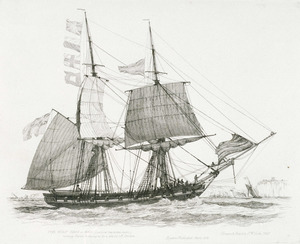HMS Wolf (1814) facts for kids

The Wolf (late of the Royal Navy) making Signal and laying to, for a Pilot off Dover in 1828
|
|
Quick facts for kids History |
|
|---|---|
| Name | HMS Wolf |
| Ordered | 8 August 1810 |
| Builder | Woolwich Dockyard (M/s Edward Sison) |
| Laid down | August 1812 |
| Launched | 16 September 1814 |
| Fate | Sold 27 January 1825 |
| Name | Wolf |
| Acquired | 1825 by purchase |
| Fate | Wrecked 1837 |
| General characteristics | |
| Class and type | Crocus-class brig-sloop |
| Type | Brig-sloop |
| Tons burthen | 25254⁄94, or 263, or 265 (bm) |
| Length |
|
| Beam | 25 ft 7 in (7.8 m) |
| Depth of hold | 12 ft 8+1⁄2 in (3.9 m) |
| Sail plan | Brig rigged |
| Complement | 86 |
| Armament |
|
Imagine a powerful sailing ship from a long time ago! HMS Wolf was a special kind of ship called a brig. It had 14 guns and belonged to the Royal Navy, which is like the UK's navy. It was built in 1814 at Woolwich Dockyard. However, it was a bit too late for the big wars happening then.
Later, in 1825, the Navy sold her. She then became a ship that carried goods and even hunted whales! Sadly, she sank in 1837 in the South Seas.
Contents
After being built, the Wolf sailed to a place called Sheerness in 1814.
Serving on the Irish Station
A commander named Bernard Yeoman took charge of the Wolf in 1819. He sailed her to the Cork station in Ireland. For a while, the ship served along the Irish coast.
Royal Escort Duty
In 1821, something very exciting happened! King George IV visited Dublin, Ireland. The Wolf was chosen to be part of his special naval escort.
Commander Yeoman often had dinner with the King on the royal yacht, HMY Royal George. While the King was in Dublin, Commander Yeoman even stayed with the royal household. He was often seen with the King in public, almost like he was part of the King's personal team!
Life as a Commercial Ship
In 1825, the Wolf finished its time with the Royal Navy. The Navy decided to sell her at Plymouth. She was bought by Thomas S. Benson for a lot of money, £3,100.
New Owners and New Jobs
The Wolf first appeared in a shipping record book called Lloyd's Register in 1826. Over the years, she had several different owners. She was used to carry goods, and later, she became a whale fishing vessel. This meant she would sail to distant oceans to hunt whales.
The Final Voyage
While working as a whaler in the Pacific Ocean, the Wolf faced a terrible accident. On August 6, 1837, she hit a hidden rock that wasn't on any maps. This rock is now known as Wolf Rock, near Lord Howe Island. The ship was badly damaged and sank.

